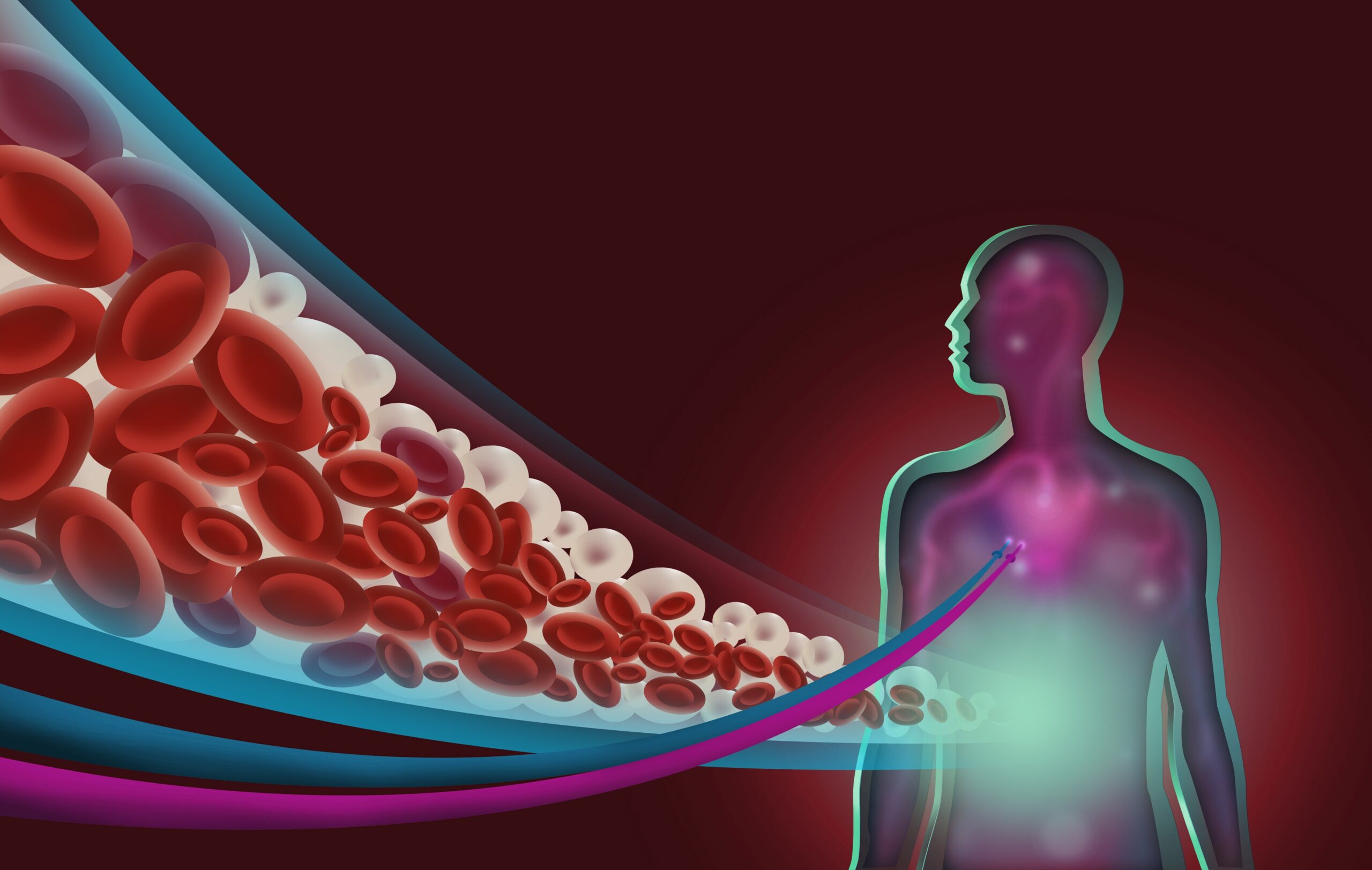Warning Signs of “Sepsis”
Sepsis (also known as septicemia) is the body’s severe response to an infection. It occurs when the immune system reacts aggressively to an infection, causing widespread inflammation that can lead to organ failure. Without timely treatment, sepsis can be life-threatening.
Dr. Sirichai Saengngammongkhol, our specialist in pulmonary medicine and pulmonary critical care medicine, and the Director of the Medicine Department at Bangkok Hospital Hua Hin, explains that the main cause of sepsis is infection, most commonly from bacteria. However, it can also be caused by viruses or fungi. Common infections that may lead to sepsis include pneumonia, urinary tract infections, abdominal or intestinal infections, infected wounds, or severe cases of COVID-19.
 How Does Sepsis Develop? Sepsis begins when an infection spreads in the body and is not treated in time. In response, the immune system releases chemicals throughout the body to fight the infection. But if too many of these chemicals are released, they can trigger widespread and severe inflammation — this is the starting point of sepsis. This inflammation can cause blood vessels to expand or leak, leading to a drop in blood pressure and reduced blood flow to vital organs such as the brain, heart, lungs, liver, and kidneys. Without enough blood, these organs can begin to fail, which can be life-threatening.
Levels of Sepsis Severity: Sepsis can get worse quickly if not treated promptly. It is divided into three stages:
How Does Sepsis Develop? Sepsis begins when an infection spreads in the body and is not treated in time. In response, the immune system releases chemicals throughout the body to fight the infection. But if too many of these chemicals are released, they can trigger widespread and severe inflammation — this is the starting point of sepsis. This inflammation can cause blood vessels to expand or leak, leading to a drop in blood pressure and reduced blood flow to vital organs such as the brain, heart, lungs, liver, and kidneys. Without enough blood, these organs can begin to fail, which can be life-threatening.
Levels of Sepsis Severity: Sepsis can get worse quickly if not treated promptly. It is divided into three stages:
 Warning Signs to Watch For: Sepsis symptoms can appear suddenly and vary from person to person. A patient might experience one or more of the following signs: High fever, chills, or sometimes a lower-than-normal body temperature, feeling unusually cold, abnormally fast heartbeat (over 90 beats per minute in adults), rapid breathing or shortness of breath, low blood pressure, confusion, dizziness, or changes in awareness, pale, clammy skin or a skin rash, decreased urine output. If any of these symptoms occur along with a known infection, seek medical attention immediately. Early diagnosis and fast treatment are critical for survival.
Diagnosis and Treatment: To diagnose sepsis, doctors will begin by reviewing your medical history, performing a physical examination, and conducting lab tests. These may include blood tests to identify infections, as well as cultures from blood, urine, sputum, stool, or pus. Imaging tests such as X-rays or CT scans may also be used to check the condition of internal organs.
The Key to Treatment: Speed Saves Lives, the most important part of treating sepsis is acting fast. The main goals are to eliminate the infection and support the body’s vital functions. Treatment usually includes:
Antibiotics: Doctors will give broad-spectrum antibiotics as quickly as possible to help control the infection.
IV Fluids: Fluids are given through a vein to help stabilize blood pressure, along with medications to raise blood pressure if needed.
Organ Support: Additional care may include oxygen therapy, a ventilator for those with breathing failure, or dialysis in cases of kidney failure.
Removing the Source of Infection: In some cases, surgery may be needed to remove the source of infection, such as draining an abscess.
Warning Signs to Watch For: Sepsis symptoms can appear suddenly and vary from person to person. A patient might experience one or more of the following signs: High fever, chills, or sometimes a lower-than-normal body temperature, feeling unusually cold, abnormally fast heartbeat (over 90 beats per minute in adults), rapid breathing or shortness of breath, low blood pressure, confusion, dizziness, or changes in awareness, pale, clammy skin or a skin rash, decreased urine output. If any of these symptoms occur along with a known infection, seek medical attention immediately. Early diagnosis and fast treatment are critical for survival.
Diagnosis and Treatment: To diagnose sepsis, doctors will begin by reviewing your medical history, performing a physical examination, and conducting lab tests. These may include blood tests to identify infections, as well as cultures from blood, urine, sputum, stool, or pus. Imaging tests such as X-rays or CT scans may also be used to check the condition of internal organs.
The Key to Treatment: Speed Saves Lives, the most important part of treating sepsis is acting fast. The main goals are to eliminate the infection and support the body’s vital functions. Treatment usually includes:
Antibiotics: Doctors will give broad-spectrum antibiotics as quickly as possible to help control the infection.
IV Fluids: Fluids are given through a vein to help stabilize blood pressure, along with medications to raise blood pressure if needed.
Organ Support: Additional care may include oxygen therapy, a ventilator for those with breathing failure, or dialysis in cases of kidney failure.
Removing the Source of Infection: In some cases, surgery may be needed to remove the source of infection, such as draining an abscess.
 Who Is at Risk? Sepsis can happen to anyone, but some people are at higher risk, including: older adults (age 65 and above) and infants, people with weakened immune systems, such as those with HIV, cancer patients undergoing chemotherapy, or individuals taking immunosuppressive medications, people with chronic diseases, such as diabetes, kidney disease, lung disease, or liver disease. Hospitalized patients, especially those in intensive care units (ICU) and people with medical devices in their bodies, such as urinary catheters or IV lines.
Prevention starts with good hygiene: eat fresh, clean, and well-cooked food, and wash your hands regularly.
Take proper care of infected wounds—if a wound becomes swollen, red, or warm, these are warning signs and you should see a doctor immediately.
For people with chronic illnesses and older adults who are more prone to infections should be extra careful to avoid wounds and stay healthy.
Vaccinations, such as the pneumococcal vaccine, help prevent pneumonia.
“Sepsis is a medical emergency that needs urgent treatment because it can be deadly in a very short time. The faster it is treated, the better the chance of survival. If you or someone close to you shows signs of sepsis, don’t wait—go to the hospital right away” Dr. Sirichai concludes.
**************************************************************************
For more information and booking an appointment, please contact :
Tel. 032-616-800 Call Center, Bangkok Hospital Hua Hin
Tel: 032-616-880 (7.00 – 19.00 hrs.) Out-Patient Department, ground floor
Tel: 032-616-888 (24 Hours) Emergency
News & Information >> Line ID : @bangkokhuahin
Who Is at Risk? Sepsis can happen to anyone, but some people are at higher risk, including: older adults (age 65 and above) and infants, people with weakened immune systems, such as those with HIV, cancer patients undergoing chemotherapy, or individuals taking immunosuppressive medications, people with chronic diseases, such as diabetes, kidney disease, lung disease, or liver disease. Hospitalized patients, especially those in intensive care units (ICU) and people with medical devices in their bodies, such as urinary catheters or IV lines.
Prevention starts with good hygiene: eat fresh, clean, and well-cooked food, and wash your hands regularly.
Take proper care of infected wounds—if a wound becomes swollen, red, or warm, these are warning signs and you should see a doctor immediately.
For people with chronic illnesses and older adults who are more prone to infections should be extra careful to avoid wounds and stay healthy.
Vaccinations, such as the pneumococcal vaccine, help prevent pneumonia.
“Sepsis is a medical emergency that needs urgent treatment because it can be deadly in a very short time. The faster it is treated, the better the chance of survival. If you or someone close to you shows signs of sepsis, don’t wait—go to the hospital right away” Dr. Sirichai concludes.
**************************************************************************
For more information and booking an appointment, please contact :
Tel. 032-616-800 Call Center, Bangkok Hospital Hua Hin
Tel: 032-616-880 (7.00 – 19.00 hrs.) Out-Patient Department, ground floor
Tel: 032-616-888 (24 Hours) Emergency
News & Information >> Line ID : @bangkokhuahin
 How Does Sepsis Develop? Sepsis begins when an infection spreads in the body and is not treated in time. In response, the immune system releases chemicals throughout the body to fight the infection. But if too many of these chemicals are released, they can trigger widespread and severe inflammation — this is the starting point of sepsis. This inflammation can cause blood vessels to expand or leak, leading to a drop in blood pressure and reduced blood flow to vital organs such as the brain, heart, lungs, liver, and kidneys. Without enough blood, these organs can begin to fail, which can be life-threatening.
Levels of Sepsis Severity: Sepsis can get worse quickly if not treated promptly. It is divided into three stages:
How Does Sepsis Develop? Sepsis begins when an infection spreads in the body and is not treated in time. In response, the immune system releases chemicals throughout the body to fight the infection. But if too many of these chemicals are released, they can trigger widespread and severe inflammation — this is the starting point of sepsis. This inflammation can cause blood vessels to expand or leak, leading to a drop in blood pressure and reduced blood flow to vital organs such as the brain, heart, lungs, liver, and kidneys. Without enough blood, these organs can begin to fail, which can be life-threatening.
Levels of Sepsis Severity: Sepsis can get worse quickly if not treated promptly. It is divided into three stages:
- Sepsis: The early stage with symptoms like fever, rapid breathing, fast heartbeat, feeling cold, or confusion.
- Severe Sepsis: The infection worsens, causing organs to start failing, such as difficulty breathing or reduced kidney function.
- Septic Shock: The most serious stage, where blood pressure drops dangerously low, leading to shock. This causes multiple organs to fail and carries a high risk of death.
 Warning Signs to Watch For: Sepsis symptoms can appear suddenly and vary from person to person. A patient might experience one or more of the following signs: High fever, chills, or sometimes a lower-than-normal body temperature, feeling unusually cold, abnormally fast heartbeat (over 90 beats per minute in adults), rapid breathing or shortness of breath, low blood pressure, confusion, dizziness, or changes in awareness, pale, clammy skin or a skin rash, decreased urine output. If any of these symptoms occur along with a known infection, seek medical attention immediately. Early diagnosis and fast treatment are critical for survival.
Diagnosis and Treatment: To diagnose sepsis, doctors will begin by reviewing your medical history, performing a physical examination, and conducting lab tests. These may include blood tests to identify infections, as well as cultures from blood, urine, sputum, stool, or pus. Imaging tests such as X-rays or CT scans may also be used to check the condition of internal organs.
The Key to Treatment: Speed Saves Lives, the most important part of treating sepsis is acting fast. The main goals are to eliminate the infection and support the body’s vital functions. Treatment usually includes:
Antibiotics: Doctors will give broad-spectrum antibiotics as quickly as possible to help control the infection.
IV Fluids: Fluids are given through a vein to help stabilize blood pressure, along with medications to raise blood pressure if needed.
Organ Support: Additional care may include oxygen therapy, a ventilator for those with breathing failure, or dialysis in cases of kidney failure.
Removing the Source of Infection: In some cases, surgery may be needed to remove the source of infection, such as draining an abscess.
Warning Signs to Watch For: Sepsis symptoms can appear suddenly and vary from person to person. A patient might experience one or more of the following signs: High fever, chills, or sometimes a lower-than-normal body temperature, feeling unusually cold, abnormally fast heartbeat (over 90 beats per minute in adults), rapid breathing or shortness of breath, low blood pressure, confusion, dizziness, or changes in awareness, pale, clammy skin or a skin rash, decreased urine output. If any of these symptoms occur along with a known infection, seek medical attention immediately. Early diagnosis and fast treatment are critical for survival.
Diagnosis and Treatment: To diagnose sepsis, doctors will begin by reviewing your medical history, performing a physical examination, and conducting lab tests. These may include blood tests to identify infections, as well as cultures from blood, urine, sputum, stool, or pus. Imaging tests such as X-rays or CT scans may also be used to check the condition of internal organs.
The Key to Treatment: Speed Saves Lives, the most important part of treating sepsis is acting fast. The main goals are to eliminate the infection and support the body’s vital functions. Treatment usually includes:
Antibiotics: Doctors will give broad-spectrum antibiotics as quickly as possible to help control the infection.
IV Fluids: Fluids are given through a vein to help stabilize blood pressure, along with medications to raise blood pressure if needed.
Organ Support: Additional care may include oxygen therapy, a ventilator for those with breathing failure, or dialysis in cases of kidney failure.
Removing the Source of Infection: In some cases, surgery may be needed to remove the source of infection, such as draining an abscess.
 Who Is at Risk? Sepsis can happen to anyone, but some people are at higher risk, including: older adults (age 65 and above) and infants, people with weakened immune systems, such as those with HIV, cancer patients undergoing chemotherapy, or individuals taking immunosuppressive medications, people with chronic diseases, such as diabetes, kidney disease, lung disease, or liver disease. Hospitalized patients, especially those in intensive care units (ICU) and people with medical devices in their bodies, such as urinary catheters or IV lines.
Prevention starts with good hygiene: eat fresh, clean, and well-cooked food, and wash your hands regularly.
Take proper care of infected wounds—if a wound becomes swollen, red, or warm, these are warning signs and you should see a doctor immediately.
For people with chronic illnesses and older adults who are more prone to infections should be extra careful to avoid wounds and stay healthy.
Vaccinations, such as the pneumococcal vaccine, help prevent pneumonia.
“Sepsis is a medical emergency that needs urgent treatment because it can be deadly in a very short time. The faster it is treated, the better the chance of survival. If you or someone close to you shows signs of sepsis, don’t wait—go to the hospital right away” Dr. Sirichai concludes.
**************************************************************************
For more information and booking an appointment, please contact :
Tel. 032-616-800 Call Center, Bangkok Hospital Hua Hin
Tel: 032-616-880 (7.00 – 19.00 hrs.) Out-Patient Department, ground floor
Tel: 032-616-888 (24 Hours) Emergency
News & Information >> Line ID : @bangkokhuahin
Who Is at Risk? Sepsis can happen to anyone, but some people are at higher risk, including: older adults (age 65 and above) and infants, people with weakened immune systems, such as those with HIV, cancer patients undergoing chemotherapy, or individuals taking immunosuppressive medications, people with chronic diseases, such as diabetes, kidney disease, lung disease, or liver disease. Hospitalized patients, especially those in intensive care units (ICU) and people with medical devices in their bodies, such as urinary catheters or IV lines.
Prevention starts with good hygiene: eat fresh, clean, and well-cooked food, and wash your hands regularly.
Take proper care of infected wounds—if a wound becomes swollen, red, or warm, these are warning signs and you should see a doctor immediately.
For people with chronic illnesses and older adults who are more prone to infections should be extra careful to avoid wounds and stay healthy.
Vaccinations, such as the pneumococcal vaccine, help prevent pneumonia.
“Sepsis is a medical emergency that needs urgent treatment because it can be deadly in a very short time. The faster it is treated, the better the chance of survival. If you or someone close to you shows signs of sepsis, don’t wait—go to the hospital right away” Dr. Sirichai concludes.
**************************************************************************
For more information and booking an appointment, please contact :
Tel. 032-616-800 Call Center, Bangkok Hospital Hua Hin
Tel: 032-616-880 (7.00 – 19.00 hrs.) Out-Patient Department, ground floor
Tel: 032-616-888 (24 Hours) Emergency
News & Information >> Line ID : @bangkokhuahin